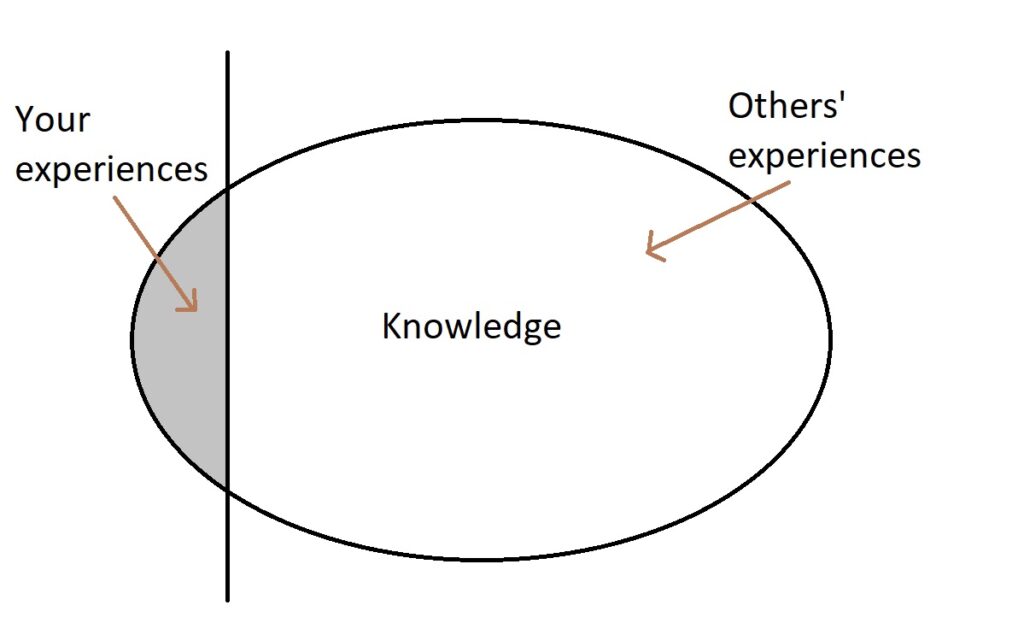Smartness or intelligence can be defined in several ways. I won’t bore you with all the definitions. No matter how you slice and dice it, smartness boils down to problem-solving. You’re smart in my book if you’re good at solving problems, especially complex ones.
What determines how well we’re able to solve a problem?

One word: Knowledge.
In a previous article on overcoming challenges, I said that we could best think about problem-solving using the analogy of puzzles. Like a puzzle, a problem has pieces you absolutely need to know about.
When you know about these pieces, you can then ‘play around’ around with those pieces to solve the problem.
Knowing the pieces is all about learning everything you can about the nature of the problem. Or, at least, learning enough to be able to solve the problem.
Hence, knowledge or understanding is essential for problem-solving.
It follows that the more knowledge you have, the smarter you will be.
Street smart vs. book smart
This is where street smart vs. book smart comes in. Both street smart and book smart people are trying to achieve the same thing- an increase in knowledge to become better problem-solvers. Where they differ is how they predominantly gain knowledge.
Street smart people gain knowledge from their own experiences. Book smart people gain knowledge from others’ experiences, documented in books, lectures, courses, and so forth.
Street smartness is gaining first-hand knowledge by being in the trenches and getting your hands dirty. Book smartness is second-hand knowledge gained while you sit comfortably on a chair or sofa.
Key points of difference
Let’s list out the main differences between street and book smart people:
1. Knowledge source
As mentioned above, the knowledge source for street smart people is the pool of their own experiences. Book smart people learn from the experience of others. Both are trying to become better problem-solvers by increasing their knowledge.
2. Knowledge type
Street smart people are focused on learning how to do things. They have practical knowledge. They’re good at getting things done. Execution is of utmost importance because that’s how they learn.
Book smart people care about the ‘what’ and the ‘why’ in addition to the ‘how’. Learning deeply about the problem at hand is of utmost importance. Execution tends to fall by the wayside.
3. Skills
Street smart people tend to be generalists. They tend to know a little bit about everything. They know enough to get the job done. They tend to have good survival, emotional and social skills.
Book smart people tend to be specialists. They know a lot about one area and little about other areas. They’re focused on developing their cognitive skills. Emotional and social skills tend to get ignored.
4. Decision-making
Street smart people can make quick decisions because they know they don’t have to know everything to get started. They have a bias for action.
Book smart people take a long time to decide because they keep digging and looking for the pros and cons of a decision. They tend to suffer from analysis paralysis.
5. Risk-taking
Risk-taking is at the heart of ‘learning by experience’. Street smart people know that not taking risks is the biggest risk.
One of the reasons book-smart people are so highly invested in understanding the nature of a problem is so they can minimize risks.
6. Rigidity type
Both street and book-smart people can be rigid in their ways. However, they differ in the way they’re inflexible.
Street smart people have experience rigidity. Their knowledge is confined to their experiences. If they haven’t experienced something, they do not know about it.
Book smart people have knowledge rigidity. Their knowledge is mostly confined to theoretical knowledge. If they haven’t read about it, they don’t know about it.
7. Structures and rules
Street smart people loathe structures and rules. They feel trapped in a structured environment. They’re rebels who want to do things their way.
Book smart people feel safe in a structured environment. They need rules to thrive.
8. Speed of learning
Experience may be the best teacher, but it’s also the slowest. Street smart people are slow learners because they rely entirely on their experience.
Book smart people are fast learners. They know they can’t have all the experience to learn all that they need to learn. They shorten their learning curves by learning from the experiences of others.
9. Abstract thinking
Street smart people tend to be limited in their thinking. While they can think enough to solve everyday problems, they struggle with abstract or conceptual thinking.
Abstract thinking is a forte of book-smart people. They’re deep thinkers and like playing around with concepts and ideas. They can articulate the inarticulable.
10. Scientific temper
Street smart people tend to have less regard for science and expertise. They tend to over-rely on their own experience.
Book smart people tend to respect science. Since they have expertise themselves, they can appreciate other people’s expertise.
11. Improvisation
Street smart people know how to think on their feet and improvise. They have high situational awareness and can devise creative solutions to problems.
Book smart people tend to lack improvisation skills. If something goes against what they’ve learned from others, they find it hard to deal with.
12. Bigger picture
Street smart people are tactical and focused on the details. They tend to miss the bigger picture. Book smart people are strategic, reflective and always have the bigger picture in mind.
| Point of difference | Street smart | Book smart |
| Knowledge source | Own experiences | Others’ experiences |
| Knowledge type | Practical | Theoretical |
| Skills | Generalists | Specialists |
| Decision-making | Fast | Slow |
| Risk-taking | Seeking risk | Minimizing risk |
| Rigidity type | Experience rigidity | Knowledge rigidity |
| Structures and rules | Hate rules | Like rules |
| Speed of learning | Slow | Fast |
| Abstract thinking | Poor | Good |
| Scientific temper | Little regard for science | High regard for science |
| Improvisation skills | Good | Poor |
| Bigger picture | Not focused on the bigger picture | Focused on the bigger picture |
You need both
Having gone through the above list, you may have realized that both learning styles have their pros and cons. You need both street and book smartness to be an effective problem-solver.
It’s rare to find people with a good balance of book and street smartness. You often see people at the extremes: Book smart people who keep gaining knowledge without implementation. And street-smart people who repeat the same actions without making progress.
You want to be both book and street-smart. Book smart so you can adopt a scientific mindset, focus on the bigger picture, be strategic and learn fast. Street smart so you can be a fierce executor.
If you forced me to choose one, I’d lean slightly more toward being book smart. And I have good reasons for that.
Why I think book smartness is slightly better
If you ask people which type of smartness is better, most of them will say street smartness. I think that stems from the fact that book smartness is easier to acquire than street smartness.
While it’s true, I’ve realized that people grossly underestimate the importance of knowledge. They underestimate how much they need to know and the depth of knowledge they need to solve complex problems.

Today, we live in a knowledge economy where knowledge is the most valuable resource.
Book smartness helps you learn fast. The faster you learn, the quicker you can solve problems- especially the complex problems of the modern world.
Not only do book-smart people learn faster, but they also learn more. A book is nothing but a person’s collection of their experiences and what they’ve learned from others’ experiences.
So,
Street smart = Own experiences
Book smart = Others’ experiences [Their experiences + (What they’ve learned from others’ experiences/books)]
Book smart = Street smartness of others + Their book smartness
This is what makes learning via book smartness exponential. Humans have thrived because they found a way to crystallize knowledge in books/poetry and transfer it to the next generation.
Thanks to this knowledge transfer, the next generation didn’t have to make the same mistakes as the previous generation.
“One glance at a book and you hear the voice of another person, perhaps someone dead for 1,000 years. To read is to voyage through time.”
– Carl Sagan
It’s great to learn from your own mistakes, but it’s much better to learn from others’ mistakes. You don’t live long enough to make all the mistakes you need to make, and some mistakes can be too costly.
Do you want to be the guy who learns that a plant is poisonous by eating and dying? Or would you rather that someone else did it? You learn not to eat that plant by learning from the experience of a noble soul who sacrificed themselves for humanity.
When people accomplish great things in life, what do they do? Do they write books, or do they tell others:
“Hey, I’ve achieved great things, but I won’t document what I’ve learned. You go learn on your own. Good luck!”
Anything- literally anything, is teachable. Even street smartness. I just did a quick search on Amazon, and there’s a book there on street smartness for entrepreneurs.
While it may seem ironic at first glance, you can learn street smartness via book smartness, but you can’t learn book smartness via street smartness.
Many street-smart people don’t pick up a book because they think they know everything. If they did, they’d become invincible.
Take the street vs book smart quiz to check your level of street vs book smartness.
